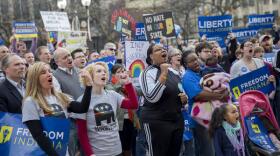Attorney General Roy Cooper said Wednesday he supports requiring North Carolina police to wear body cameras and rejects proposals allowing public officials and potentially businesses to cite religion for declining to serve gay couples.
Cooper, a Democrat preparing a run for governor in 2016, told The Associated Press in an interview that equipping patrol officers with cameras should be part of a comprehensive plan to improve law enforcement after recent police shootings of black men nationally, including one last weekend in South Carolina. Several House Democrats have filed a bill requiring cameras be worn and recording most interactions between officers and the public.
"We need more training and better pay to get and keep good officers," Cooper told the AP in a phone interview, adding that community policing was also important and diversity in law enforcement agencies so that they "look like the communities that they protect."
Cooper backed away from another Democratic proposal giving all local governments authority to create citizen review boards that could investigate misconduct allegations and punish officers. He called his plan "the better way."
If he were governor, Cooper said, he would veto two Republican legislative proposals related to gay marriage.
One would allow magistrates and assistant and deputy clerks of court to refuse to carry out all civil marriages based on "sincerely held religious objection," presumably to gay marriage. Supporters say the other measure protects businesses from government interference. It is similar to Indiana's religious freedom law that sparked furor nationally.
"There are laws in place that protect religious liberties," Cooper said. "We don't need these laws that hurt people and our economy." Cooper supports gay marriage and stopped defending the North Carolina ban in court last summer after a federal appeals court overturned Virginia's prohibition. State-sanctioned gay marriages began in North Carolina last October.
Cooper said magistrates — constitutional officers whose job duties including presiding over civil marriages — "should fulfill the job that they were hired to do." The marriage exemption bill sponsored by Senate leader Phil Berger, R-Rockingham, has passed the Senate. "Religious freedom restoration" bills in the House and Senate have received no debate so far.
GOP Gov. Pat McCrory also has expressed opposition to the two proposals but hasn't said specifically whether he would veto them.
Cooper, the elected attorney general since 2001, hasn't formally announced as a gubernatorial candidate but has been preparing since 2013 for a bid to try to unseat McCrory. He is raising campaign funds and has run ads on social media calling out McCrory and his GOP legislative allies, saying they have harmed North Carolina's public education system.
While also critical of McCrory's tax policy, Cooper said he agreed with McCrory's efforts to renew funding for the Job Development Investment Grant program, which provides targeted cash incentives to companies that build and create jobs in the state.
Cooper criticized some Republicans who promoted a transportation funding bill signed into law last week by McCrory by highlighting that it would reduce the gasoline tax. The tax rate, however, will be falling by less than analysts project this summer had the previous tax formula stayed in effect.
"They shouldn't tell people they'll be cutting taxes when they're actually raising them," Cooper said later by email.
State Republicans have tried to make Cooper's deferral to announce his candidacy an issue. GOP spokesman Ricky Diaz did so again Wednesday, arguing it allows Cooper to avoid some public scrutiny. Democrats counter that McCrory held back on his 2012 gubernatorial candidacy announcement until early that year after prep and fundraising in 2011.








